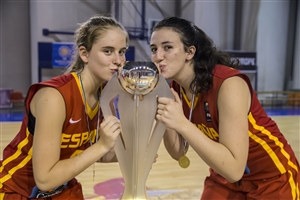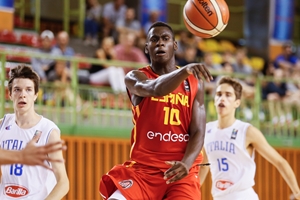
Stacking the teams for the 2016 FIBA Asia Challenge
MANILA (Enzo Flojo's Asia on my Mind) - The 2016 FIBA Asia Challenge in Tehran, Iran will be the last continental FIBA tournament made up of an all-Asian cast of countries. That alone gives it deep significance, but there is also an important prize for whoever finishes among the top five — an added berth for their respective sub-zones in the 2017 FIBA Asia Cup.
Twelve of the most talent-laden teams in all of Asia will vie for those five berths and the bragging rights to be called the best team for 2016. Let’s have a quick overview of each one.
China
The Chinese didn’t have a very good experience in the last iteration of this tournament two years ago in Wuhan. China lost to India for the first time in history, failed to make the tournament Final and lost in the endgame to the Philippines in the battle for third place. They didn’t send their best team then, and they’re not sending their best team here. Five Olympians are in China’s 23-man pool — Zhao Jiwei, Ding Yanyuhang, Li Muhao, Zou Yuchen and Zhai Xiaochuan — but none of them are exactly game-changers at this level. Other young standouts who can make the final twelve and make an impact are Zhao Yanhao, Hu Jinqiu and Fan Ziming, while veterans Tao Hanlin and Makan Kelanbaike, both of whom played in that failed 2014 bid, are certainly looking to make up for the debacle two years ago.
Chinese Taipei
Like many of the teams in this tournament, Chinese Taipei will be without many of their seasoned veterans, but that was also the case when they finished in second place two years ago. Having Quincy Davis is always going to be a boost, especially without Tseng Wen-Ting, Wu Tai-Hao or Lee Te-Wei up front. It’ll be a great chance for guys like Liu Cheng, Hu Long-Mao and Chou Yi-Hsiang, however, to formally take the reins of the team now that the iconic Lin Chih-Chieh has retired from international play.
India
Everyone needs to watch out for India, which had a banner performance in 2014 and followed that up by finishing among the continent’s top eight teams in 2015. These guys have been improving by leaps and bounds, and I wouldn’t be surprised in the least if they catch even bigger fish this year. The terrific trio of Vishesh Bhriguvanshi, Amjyot Singh and Amritpal Singh will certainly be this squad’s cornerstone, while the impending return of Satnam Singh Bhamara adds a lot of intrigue (and size!) to their campaign.
Iran
Team Melli will be without paragons Samad Nikkhah Bahrami, Hamed Afagh and Mahdi Kamrani, but their 22-man pool is still chock-full of talent. Budding stars Behnam Yakhchali, Sajjad Mashayekhi and Mohammad Jamshidi are expected to be among this team’s leaders together with old reliables Oshin Sahakian and Arsalan Kazemi. Of course, it also goes without saying that the mere presence of Hamed Haddadi immediately makes the defending champions quite the title favorites.
Will 🇮🇷 make it a Hat-trick of 🏆🏆🏆 when they host the #FIBAAsiaChallenge in September?https://t.co/z1Gw9GLAHq
— baloncestovenezolano (@basket_criollo) August 16, 2016
Iraq
There really aren’t any names on Iraq’s 20-man pool that will stand out, but this team still cannot be overlooked given how they finished among the top three of West Asia earlier this year. Victories over Lebanon and Syria enabled Iraq to punch their tickets to the FIBA Asia Challenge, and, for sure, they won’t be happy just being in Tehran. Young big man Ihab Al-Zuhairi, however, could be one to watch, especially after being a dominant force in the recent 2016 FIBA Asia U18 Championship.
Japan
The Akatsuki Five will enter this tournament as one of the most experienced and veteran-laden squads, and that’s a testament to their seriousness in making a splash here. They turned a lot of heads by finishing among the top four in the 2015 FIBA Asia Championship, and their experience at the FIBA OQT will also serve them well as they will definitely exert as much effort as they can to clinch the title. As always, the Takeuchi twins, Makoto Hiejima and Takatoshi Furukawa are expected to be among the shoo-ins for their final twelve.
Jordan
I remember watching Sam Daghlas tear it up for Jordan, especially in the 2011 FIBA Asia Championship when they finished in second place, but now he’s calling the shots from the sidelines. It’s not certain if pillars like Zaid Abbas, Wesam Al Sous and Ali Jamal Zaghab will make the team, but if they do, then the rest of the field better watch out because Al Nashama won’t be pushovers.
Kazakhstan
It’s a little surprising that the Snow Leopards will be without many of their veterans. In fact, only Pavel Ilin returns from the roster that competed in the 2015 FIBA Asia Championship. Perennial team leaders like Anton Ponomarev, Dimitriy Klimov and Rustam Yargaliev aren’t around, as well as naturalized player Jerry Jamar Johnson and rising star Anatoliy Kolesnikov. Returning, though, are big men Mikhail Yevstigneyev and Vitaly Lapchenko from their 2013 FIBA Asia squad. U18 star Nikita Timofeyev is also one to watch.
Korea
Like Japan, Korea seem to be in “win now” mode after injecting a ton of experience into what initially looked like a young pool. Veterans Yang DongGeun, Kim TaeSul, Cho SungMin, Yang HeeJong, Heo IlYoung, Oh SeKeun and Ha SeungJin might not all make it to the final roster, but their inclusion in the pool is still a sign that Korea aren’t ready to treat this competition as a simple rebuilding experience, especially since they’ve never finished on the podium in this tournament since its inauguration in 2004.
Philippines
For the first time since 2010, the Philippines won’t send a significantly PBA-backed team to a continental tournament. This team formerly known as the Gilas Cadets won’t have any naturalized reinforcement and will have minimal help from the country’s professional ranks, so the outlook isn’t exactly rosy. Still, this is supposed to be the first step in the country’s revamp of the national side, and, well, first steps are always difficult.
Check out the #FIBAAsiaChallenge Groups (via @FIBA)#SIAsia pic.twitter.com/Ow1sKZvPxH
— SportsIllustrated PH (@SI_PHnews) August 15, 2016
Qatar
Al Annabi look to be dead-set on making a statement in this tournament as evidenced by their traveling to Serbia for training camp and preparation games. Veterans dot the team’s 23-man national pool along with a slew of naturalized players like Trey Johnson, Dominic James, Boney Watson and Tanguy Ngombo. Of course, only of them is set to make the final roster, but experienced players like Khalid Suliman Abdi, Mansour El Hadary, Mohammed Yousuf and Erfan Ali Saeeed are sure to carry the fight for Qatar.
@FIBA Asia Challegne Cup 2016 Draw (Iran, 9-18 September)
— Qatar Basketball FD (@qatarbf) August 14, 2016
Group C: #Iran , #Qatar, #Iraq#FIBAAsiaChallenge pic.twitter.com/koKKbunaLA
Thailand
The Thais typically don’t make much noise at the continental level, but their strong play in the 2016 SEABA Stankovic Cup make them, at the very least, a team to watch here. Up-and-coming talents like Patiphan Klahan and Teerawat Chanthachon are intriguing, while naturalized player Fred Goldstein is expected to make a rousing debut as the Thais try to buck the impression that they are minnows in Asian basketball.
Enzo Flojo
FIBA
FIBA's columnists write on a wide range of topics relating to basketball that are of interest to them. The opinions they express are their own and in no way reflect those of FIBA.
FIBA takes no responsibility and gives no guarantees, warranties or representations, implied or otherwise, for the content or accuracy of the content and opinion expressed in the above article.

















